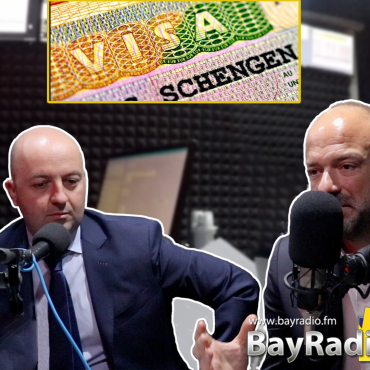-
 play_arrow
play_arrow
BayRadio Listen Live Broadcasting in Spain


Boris Johnson has rejected Nicola Sturgeon’s call for a new referendum on independence in 2020 – but the Scottish first minister says this “will not stand”.
The SNP’s goal is for Scotland to leave the United Kingdom and rejoin the EU as an independent member state.
So how is Ms Sturgeon likely to respond?
Why is Scottish independence back in the spotlight?
Scotland held an independence referendum in September 2014, with the No campaign winning 55% of the votes.
But then, in 2016, Brexit happened. Voters in Scotland backed Remain by 62% – but those across the UK as a whole voted Leave by 52%.
The SNP saw this as a “material change in circumstances” which would justify a second independence ballot, because Scotland faced being taken out of the EU “against its will”.
And the party has since performed strongly in elections. It won 48 of the 59 seats north of the border in last month’s general election, while campaigning to “put Scotland’s future in Scotland’s hands”![]()
Scotland
There has long been legal debate over whether the Scottish Parliament, rather than MPs at Westminster, could pass the laws needed for a new vote on independence to be held – but the matter has never been tested in court.
In any case, Ms Sturgeon wants the UK government to agree a transfer of powers allowing a referendum to be held, as happened in 2014.
Ms Sturgeon, the SNP leader, says this would ensure the referendum result was seen as being entirely legal and legitimate, particularly by the EU.
But Prime Minister Boris Johnson has flatly rejected her request, arguing that the 2014 poll was a “once in a generation” event.
What will Nicola Sturgeon do now?
The first minister says Mr Johnson’s position is unsustainable, and that his refusals will simply increase support for independence.
She has warned that “you can’t hold Scotland in the union against its will”.
If these political arguments do not budge Mr Johnson, the first minister has not ruled out taking him to court. However this would be a difficult and potentially lengthy process, and constitutional scholars have warned that “there are no legal short cuts” around the political battlefield.
One thing Ms Sturgeon has ruled out is an unauthorised vote. She says the example of Catalonia proves this “does not lead to independence”.
Perhaps the clearest option open to her might be to target a really big win in the Scottish Parliament elections in 2021, on an explicit platform of demanding a referendum – but the SNP argues that it has won several electoral mandates already.
Would Scots vote for independence?
This is the big question – after all Nicola Sturgeon doesn’t just want to hold a referendum, she wants to win one.
Polling data collected by What Scotland Thinks suggests an increase in support for independence – but it generally remains just short of a majority.
Excluding “don’t knows”, the average of polls this year has been 51% No to 49% Yes. The average for 2018 was 55% to 45% – the same as the 2014 referendum.
The SNP hopes that a combination of Brexit and hostility within Scotland to Mr Johnson’s refusals will start to push the dial further in its direction.
Would an independent Scotland stay in the EU?
In practice, Scotland would not become independent the day after a Yes vote – there would have to be a period of transition.
In 2014, the pro-independence side said it would take 18 months to set up an independent Scottish state.
Even if a referendum was held tomorrow, the transition would therefore run beyond the end of 2020 – when the UK is due to complete its exit from the EU.
This means Scotland would leave the EU with the rest of the UK, and would need to apply to join again.
Scottish ministers accept they would have to go through an “accession process” for EU membership, but want to start this “as soon as possible”.
What would it take for Scotland to rejoin the EU?
Scotland would have to meet the same accession criteria as any state seeking to join the EU, although it would have the advantage of having recently been a member.
While many of Scotland’s laws and regulations already match EU standards, the entry rules throw up a whole series of questions about things like currency, deficit levels and borders.
Ms Sturgeon has been pressed on many of these topics already, arguing that Scotland could initially continue to use the pound and would not need to join the euro. She says the country’s financial position could be brought within EU rules by growing the economy.
However, her own party’s prospectus for independence suggests this could take several years, whereas she wants to rejoin the EU as quickly as possible.
The first minister also wants to avoid a hard border between Scotland and England.
She has said answers about this and a whole range of other questions will be set out in detail ahead of any vote.
Written by: BayRadio News
Similar posts
Recent Posts
- Physical Exercise and a Balanced Diet Help COPD Patients Improve Their Quality of Life
- Spanish Speakers Surpass 600 Million Worldwide, but Could the True Figure Be Even Higher?
- Dr Julio Puig, expert in breast surgery
- Meniscus Injuries or Ligament Tears? Forget About Knee Pain
- More than 120,000 patients treated: Quirónsalud Torrevieja, a benchmark in oncology and breast cancer treatment

Ctra. Cabo La Nao, CC La Nao, Local 6 03730 Javea, Alicante, Spain
Advertise with us
Do you have a business in Spain? Do you provide a service to the expat community in Spain? Would you like your message to reach over 500.000 people on a weekly basis?
BayRadio is a community orientated radio station offering fantastic content to our many listeners and followers across our various platforms. Contact us now and find out what Bay can do for you!
Our business is helping your business grow.
BAY RADIO S.L. © 2024. ALL RIGHTS RESERVED. WEB DESIGN BY MEDIANIC







